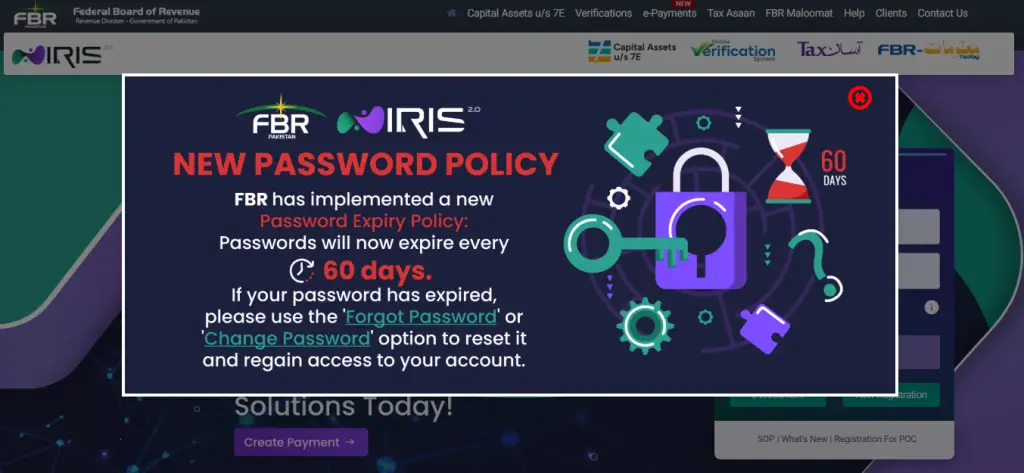How to File Your Income Tax Return in Pakistan: A Step-by-Step Guide
Income tax filing and registration are crucial processes for salaried individuals in Pakistan, as these steps ensure that they meet their tax obligations. Understanding the procedures, deadlines, and applicable tax rates is essential for ensuring compliance and avoiding penalties. This guide provides a detailed overview of income tax filing and registration for salaried individuals in Pakistan, with a focus on the Tax Year 2025 (2024-2025) and the tax rates applicable for this period.
1. Understanding Income Tax Filing for Salaried Individuals
Income tax filing refers to the process by which individuals declare their annual income to the Federal Board of Revenue (FBR) and pay the taxes owed. Salaried individuals are required to file their income tax returns if their income exceeds the taxable threshold defined by the government.
1.1 Importance of Income Tax Filing
-
Legal Compliance: Filing your income tax return ensures that you comply with the tax laws of Pakistan, avoiding penalties.
-
Eligibility for Tax Refund: If excess tax has been deducted by your employer, filing the return allows you to claim a tax refund.
-
Access to Tax Credit: Filing taxes provides the opportunity to claim allowable deductions and credits that reduce your tax liability.
2. Registration with the FBR
Before filing your income tax return, salaried individuals need to be registered with the Federal Board of Revenue (FBR). Registration with the FBR is mandatory for anyone whose income is taxable under Pakistani tax laws.
2.1 Steps for Registration
-
Obtain National Tax Number (NTN): Salaried individuals must first obtain an NTN from the FBR to register for tax purposes.
-
Online Registration: You can apply for your NTN via the FBR’s IRIS system. The process involves providing personal details, proof of income, and supporting documents.
-
Visit FBR Office: Alternatively, you can visit your nearest FBR office to complete the registration process manually.
-
-
Verify Your Registration: Once registered, ensure that your NTN details are correct in the FBR system. You can verify your NTN by logging into the FBR IRIS portal.
-
Update Your Tax Profile: It’s essential to regularly update your profile in case of any changes in income or employment status.
3. Tax Year 2025 (2024-2025) – Key Dates for Salaried Individuals
The tax year for salaried individuals in Pakistan follows the calendar year, from July 1 to June 30. Therefore, the Tax Year 2025 (2024-2025) covers the period from July 1, 2024, to June 30, 2025.
3.1 Important Filing Deadlines
-
Tax Return Filing Date: Salaried individuals must file their income tax returns by September 30, 2025 (extended deadlines may apply based on FBR notifications).
-
Payment of Taxes: Taxes must be paid at the time of filing the return if any balance is due.
3.2 Filing Process Overview
-
Prepare Documents: Collect all documents related to income, tax deductions, and other relevant details.
-
File the Return: Use FBR’s IRIS portal to file the return online. Ensure all fields are filled correctly to avoid penalties.
-
Tax Payment: If your employer hasn’t already deducted the full tax liability, pay the remaining amount when filing the return.
4. Tax Rates for Salaried Individuals for Tax Year 2025 (2024-2025)
The tax rates for salaried individuals in Pakistan are progressive, meaning the higher the income, the higher the tax rate. Below is the breakdown of the tax rates for Tax Year 2025 (2024-2025) for salaried individuals:
4.1 Income Tax Rates for Salaried Individuals
| Income Bracket | Tax Rate |
|---|---|
| Up to PKR 600,000 | No tax |
| PKR 600,001 to PKR 1,200,000 | 5% |
| PKR 1,200,001 to PKR 2,400,000 | 10% |
| PKR 2,400,001 to PKR 3,600,000 | 15% |
| PKR 3,600,001 and above | 20% |
-
Up to PKR 600,000: Salaried individuals earning up to PKR 600,000 annually are exempt from tax.
-
PKR 600,001 to PKR 1,200,000: Individuals in this income bracket are taxed at 5%.
-
PKR 1,200,001 to PKR 2,400,000: For income in this range, the tax rate is 10%.
-
PKR 2,400,001 to PKR 3,600,000: The tax rate increases to 15% for individuals earning between PKR 2,400,001 and PKR 3,600,000.
-
Above PKR 3,600,000: Individuals earning above PKR 3,600,000 will be taxed at a rate of 20%.
4.2 Tax Calculation Example
Example 1:
-
Income: PKR 1,800,000
-
Tax Calculation:
-
First PKR 600,000: No tax
-
Next PKR 600,000: Taxed at 5% = PKR 30,000
-
Remaining PKR 600,000: Taxed at 10% = PKR 60,000
-
-
Total Tax Due: PKR 30,000 + PKR 60,000 = PKR 90,000
5. Deductions & Allowances for Salaried Individuals
Salaried individuals are eligible for certain tax deductions and allowances, which can help reduce their overall tax liability. These deductions include:
5.1 Common Tax Deductions
-
Investment in Retirement Funds: Contributions to approved pension funds can be deducted.
-
Charitable Donations: Donations to registered charities are eligible for tax deductions.
-
Medical Allowances: Expenses related to medical treatment may be deducted under specific conditions.
-
Insurance Premiums: Certain insurance premiums may be claimed as deductions.
-
Home Loan Interest: Interest on loans for the purchase or construction of a home can be deducted from taxable income.
5.2 Tax Credits
-
Tax credits are available for individuals meeting specific criteria (e.g., education, health insurance) that can reduce the final tax bill.
6. Penalties for Non-Compliance
Failure to file your income tax return on time or underreporting your income can result in penalties. Here are some penalties associated with non-compliance:
-
Late Filing Penalty: If you file after the deadline, you may face a penalty of 0.1% per day on the outstanding tax amount.
-
Underreporting Penalty: If the FBR finds discrepancies in your return, a penalty of 10% to 20% can be imposed.
-
Audit Penalty: If your tax return is selected for an audit and discrepancies are found, fines and additional taxes may be levied.
7. How Tax Consultants Can Help
Tax consultants play a crucial role in helping salaried individuals navigate the complexities of income tax filing. They provide the following services:
-
Tax Planning: Helping individuals minimize tax liability through strategic planning and deductions.
-
Tax Filing Assistance: Ensuring that returns are filed correctly and on time.
-
Audit Support: Representing individuals in the event of an FBR audit and handling any tax disputes.
Conclusion
Filing income tax returns and registering with the FBR is an essential obligation for salaried individuals in Pakistan. By understanding the tax rates, filing deadlines, and available deductions, individuals can ensure compliance while potentially reducing their tax liability. If you are unsure about the process or need assistance, consulting with a tax professional can help ensure that your filing is accurate and timely.



